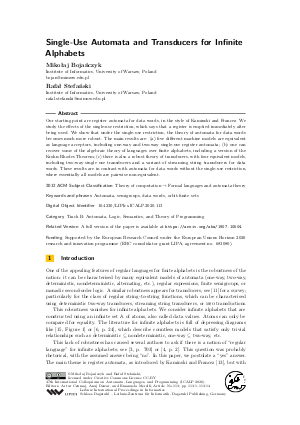Single-Use Automata and Transducers for Infinite Alphabets
Authors Mikołaj Bojańczyk, Rafał Stefański
-
Part of:
Volume:
47th International Colloquium on Automata, Languages, and Programming (ICALP 2020)
Part of: Series: Leibniz International Proceedings in Informatics (LIPIcs)
Part of: Conference: International Colloquium on Automata, Languages, and Programming (ICALP) - License:
 Creative Commons Attribution 3.0 Unported license
Creative Commons Attribution 3.0 Unported license
- Publication Date: 2020-06-29
File

PDF
LIPIcs.ICALP.2020.113.pdf
- Filesize: 1.09 MB
- 14 pages
Document Identifiers
Related Versions
-
A full version of the paper is available at https://arxiv.org/abs/1907.10504.
Subject Classification
ACM Subject Classification
- Theory of computation → Formal languages and automata theory
Keywords
- Automata
- semigroups
- data words
- orbit-finite sets
Metrics
- Access Statistics
-
Total Accesses (updated on a weekly basis)
0Document
0Metadata
Abstract
Our starting point are register automata for data words, in the style of Kaminski and Francez. We study the effects of the single-use restriction, which says that a register is emptied immediately after being used. We show that under the single-use restriction, the theory of automata for data words becomes much more robust. The main results are: (a) five different machine models are equivalent as language acceptors, including one-way and two-way single-use register automata; (b) one can recover some of the algebraic theory of languages over finite alphabets, including a version of the Krohn-Rhodes Theorem; (c) there is also a robust theory of transducers, with four equivalent models, including two-way single use transducers and a variant of streaming string transducers for data words. These results are in contrast with automata for data words without the single-use restriction, where essentially all models are pairwise non-equivalent.
Cite As Get BibTex
Mikołaj Bojańczyk and Rafał Stefański. Single-Use Automata and Transducers for Infinite Alphabets. In 47th International Colloquium on Automata, Languages, and Programming (ICALP 2020). Leibniz International Proceedings in Informatics (LIPIcs), Volume 168, pp. 113:1-113:14, Schloss Dagstuhl – Leibniz-Zentrum für Informatik (2020)
https://doi.org/10.4230/LIPIcs.ICALP.2020.113
BibTex
@InProceedings{bojanczyk_et_al:LIPIcs.ICALP.2020.113,
author = {Boja\'{n}czyk, Miko{\l}aj and Stefa\'{n}ski, Rafa{\l}},
title = {{Single-Use Automata and Transducers for Infinite Alphabets}},
booktitle = {47th International Colloquium on Automata, Languages, and Programming (ICALP 2020)},
pages = {113:1--113:14},
series = {Leibniz International Proceedings in Informatics (LIPIcs)},
ISBN = {978-3-95977-138-2},
ISSN = {1868-8969},
year = {2020},
volume = {168},
editor = {Czumaj, Artur and Dawar, Anuj and Merelli, Emanuela},
publisher = {Schloss Dagstuhl -- Leibniz-Zentrum f{\"u}r Informatik},
address = {Dagstuhl, Germany},
URL = {https://drops.dagstuhl.de/entities/document/10.4230/LIPIcs.ICALP.2020.113},
URN = {urn:nbn:de:0030-drops-125200},
doi = {10.4230/LIPIcs.ICALP.2020.113},
annote = {Keywords: Automata, semigroups, data words, orbit-finite sets}
}
Author Details
Funding
Supported by the European Research Council under the European Unions Horizon 2020 research and innovation programme (ERC consolidator grant LIPA, agreement no. 683080).
References
-
Ginzburg Abraham. Algebraic Theory of Automata. Elsevier, 1968.

-
Rajeev Alur and Pavol Černý. Expressiveness of streaming string transducers. In Foundations of Software Technology and Theoretical Computer Science, FSTTCS 2010, Chennai, India, volume 8 of LIPIcs, pages 1-12. Schloss Dagstuhl - Leibniz-Zentrum fuer Informatik, 2010.

-
Henrik Björklund and Thomas Schwentick. On notions of regularity for data languages. Theoretical Computer Science, 411(4):702-715, January 2010.

-
Mikołaj Bojańczyk. Automata for Data Words and Data Trees. In Christopher Lynch, editor, Rewriting Techniques and Applications, RTA, Edinburgh, Scottland, UK, volume 6 of LIPIcs, pages 1-4. Schloss Dagstuhl - Leibniz-Zentrum fuer Informatik, 2010.

-
Mikołaj Bojańczyk. Nominal Monoids. Theory Comput. Syst., 53(2):194-222, 2013.

- Mikołaj Bojańczyk. Slightly infinite sets, 2019. URL: https://www.mimuw.edu.pl/~bojan/paper/atom-book [cited version of September 11, 2019]. URL: https://www.mimuw.edu.pl/~bojan/paper/atom-book.
-
Mikołaj Bojańczyk, Laure Daviaud, and Shankara Narayanan Krishna. Regular and First-Order List Functions. In Logic in Computer Science, LICS, Oxford, UK, pages 125-134. ACM, 2018.

-
Michal Chytil and Vojtech Jákl. Serial Composition of 2-Way Finite-State Transducers and Simple Programs on Strings. In International Colloquium on Automata, Languages and Programming, ICALP, Turku, Finland, volume 52 of Lecture Notes in Computer Science, pages 135-147. Springer, 1977.

-
Thomas Colcombet, Clemens Ley, and Gabriele Puppis. Logics with rigidly guarded data tests. Logical Methods in Computer Science, 11(3), 2015.

-
Luc Dartois, Paulin Fournier, Ismaël Jecker, and Nathan Lhote. On reversible transducers. In International Colloquium on Automata, Languages and Programming, ICALP, Warsaw, Poland, volume 80 of LIPIcs, pages 113:1-113:12. Schloss Dagstuhl - Leibniz-Zentrum fuer Informatik, 2017.

-
Emmanuel Filiot and Pierre-Alain Reynier. Transducers, logic and algebra for functions of finite words. SIGLOG News, 3(3):4-19, 2016.

-
Emmanuel Filiot and Pierre-Alain Reynier. Copyful Streaming String Transducers. In Matthew Hague and Igor Potapov, editors, Reachability Problems, RP , London, UK, volume 10506 of Lecture Notes in Computer Science, pages 75-86. Springer, 2017.

-
Michael Kaminski and Nissim Francez. Finite-Memory Automata. Theor. Comput. Sci., 134(2):329-363, 1994.

-
Kenneth Krohn and John Rhodes. Algebraic theory of machines. i. prime decomposition theorem for finite semigroups and machines. Transactions of the American Mathematical Society, 116:450-450, 1965.

-
Frank Neven, Thomas Schwentick, and Victor Vianu. Finite state machines for strings over infinite alphabets. ACM Trans. Comput. Log., 5(3):403-435, 2004.

-
J. C. Shepherdson. The reduction of two-way automata to one-way automata. IBM Journal of Research and Development, 3(2):198-200, April 1959.

-
Imre Simon. Factorization forests of finite height. Theoretical Computer Science, 72(1):65-94, 1990.

